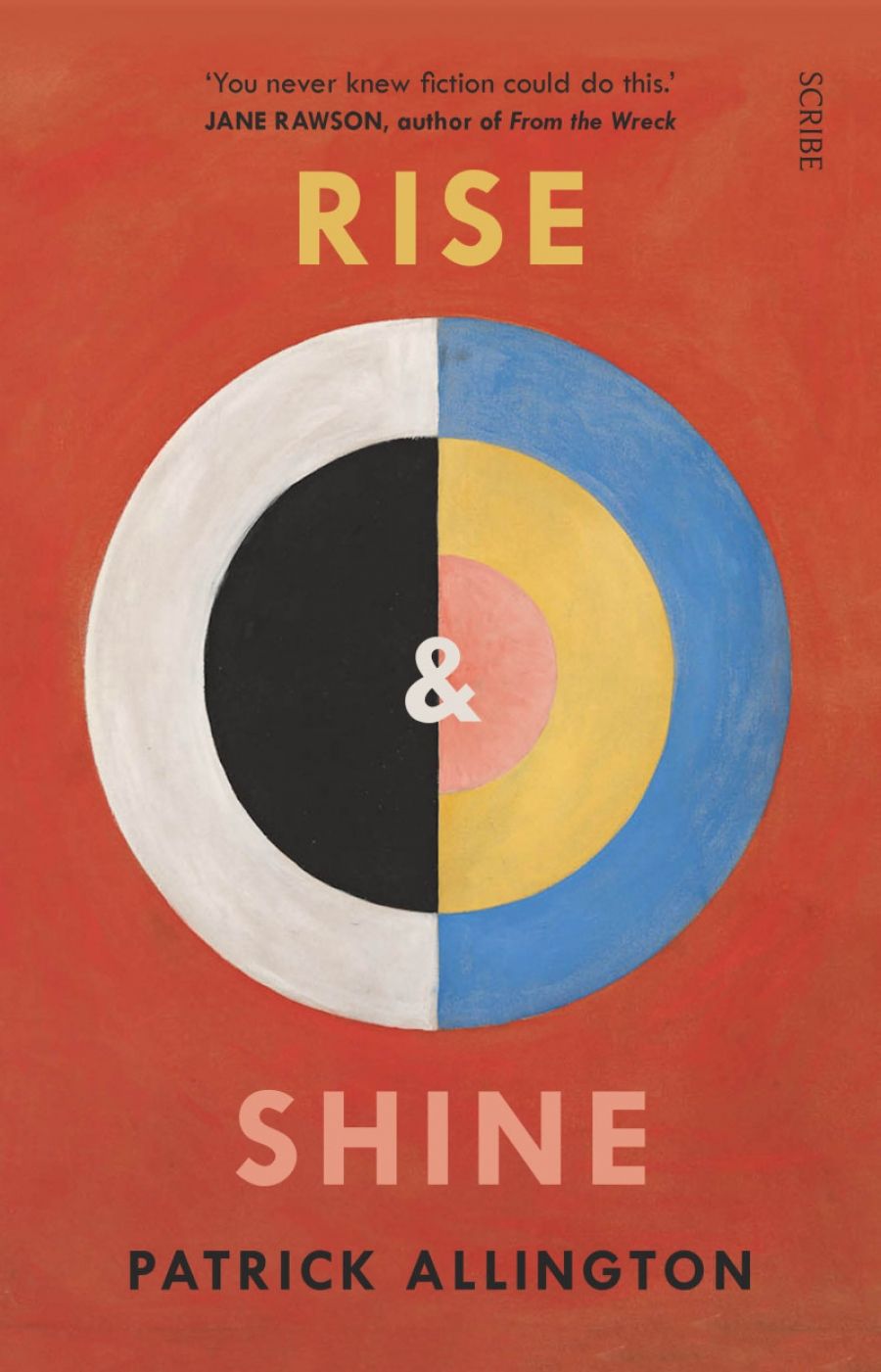
- Free Article: No
- Contents Category: Fiction
- Review Article: Yes
- Online Only: No
- Custom Highlight Text:
‘What is the use of saying, “Peace, Peace” when there is no peace below the diaphragm?’ asks Chinese writer Lin Yutang in The Importance of Living (1937). The subject of food and its manifestations – sustenance, communion, gluttony, longing – has claimed a place in the books of every era and genre, from heavenly manna in the Book of Exodus to starving gladiators in Suzanne Collins’s multi-billion-dollar The Hunger Games franchise. Writers as varied as Marcel Proust and Margaret Atwood have prioritised this theme in their work.
- Grid Image (300px * 250px):

- Book 1 Title: Rise & Shine
- Book 1 Biblio: Scribe, $27.99 pb, 240 pp
- Book 1 Readings Link: booktopia.kh4ffx.net/0VRZE
To meet the citizens’ need for ‘regular fresh footage’, the leaders have set up ‘the enterprise of making war, and filming war’. But when a mysterious illness appears in the city-states of Rise and Shine, some citizens descend into anhedonia, unable to feed off even the best battles. Others, like grief-stricken Malee, long for something else: her computer password, in Rise & Shine’s typical gallows humour, is ‘Hungryforsomething01’. This bold premise of war footage as food – a disquieting metaphor in the era of addictive social media feeds – could easily be an episode of Charlie Brooker’s Netflix series Black Mirror.
True to the novel’s dystopian exposition, the theme of surveillance looms large. Rise’s institutional gaze – by government, medical, and prison agencies – has a Foucauldian panoptic quality. Sala, an élite soldier, accepts that she’d given up her right to privacy but dislikes ‘the one-sidedness of it ... she would have liked some reciprocity: why couldn’t she see the face, the name, the life history, the grief levels of the person watching her?’
Complicating the matter is the benevolence of the city-states’ leaders. Intrusive technology is used for the common good and with unsettling, sometimes comic, politeness: ‘I do apologise for the intrusion,’ says an officer as he places a gag on the woman he arrests, ‘but it’s unavoidable under the circumstances. Let’s not make a fuss or worry your neighbours.’ A gap grows between the New Time leaders’ noble intentions and their own slip into Old Time failings, such as ‘Old Time management speak’, the use of flags (Walker remembers ‘the way bigots wielded them like semi-automatics in the last years of the Old Time’), and public adulation of leaders (‘the very excesses of the Old Time that caused the mess in the first place’). Rise’s leaders are guarded against these behaviours, yet they seem doomed to repeat them in the name of their peaceful new society.
Where dystopias almost universally pitch dissenter protagonists against a tyrannical government enemy, Rise & Shine makes the original, perhaps radical, choice to highlight the perspectives of the New Time’s leaders, themselves survivors. The omniscient narration divulges the thoughts of a (sometimes unwieldy) motley crew of characters, many in positions of power. Does this, by implication, excuse their propaganda and disciplinary measures? In the fight for collective survival, is compliance a necessary evil, a compromise for those between the devil and the now-poisonous blue sea? Or is it possible ‘the new way now needed its own new way’?
Like Allington’s first novel, the Miles Franklin-longlisted Figurehead (2009), Rise & Shine does not shy away from the complex moral terrain of political agency. Carefully, subtly, Allington lets the tension between multiple propositions build: that law and order form a part of collective survival; that service of the people can too easily slip into control of the people; that people want a leader; that effective leadership requires multiple perspectives; that people can change; that some people don’t. Allington sustains the tension until the final pages, where he offers a thought-provoking ending worthy of this imaginative take on dystopia.
The upsurge in fiction examining environmental collapse has been the subject of much literary discussion. In last month’s ABR, J.R. Burgmann’s insightful review of Ghost Species by James Bradley – aptly titled ‘Five Minutes into the Future’ – placed Bradley’s novel within the broader context of climate fiction (‘cli-fi’). Common, too, are debates on what constitutes science fiction, speculative fiction, and dystopian fiction – and indeed the usefulness of the terms. While some authors have demurred from these descriptors of their work, others, such as David Mitchell, whose Cloud Atlas (2004) was shortlisted for the Arthur C. Clarke Award for science fiction and the Man Booker Prize, have embraced both the so-called ‘genre’ and ‘literary’ aspects of their work. It is refreshing, then, to see publisher Scribe take the broad view, describing Rise & Shine as ‘literary speculative fiction’.
There is something uncanny about reviewing a post-apocalyptic novel from the confines of self-isolation during a global pandemic. As I read Rise & Shine, phrases like ‘Chief Medical Officer’, ‘data on the strange illness’, and ‘we must all do our part’ began to blend with news updates. More disquieting still were the questions the book raised about the social contract in times of crisis, self-sacrifice for the good of the majority, and the trade-off between surveillance and survival. It is to Allington’s credit that his pre-Covid-19 writing rings true in the unusual moment of its publication. In this, Rise & Shine is a timely reminder that keeping a society free requires constant vigilance. And that, as it were, is food for thought.


Comments powered by CComment